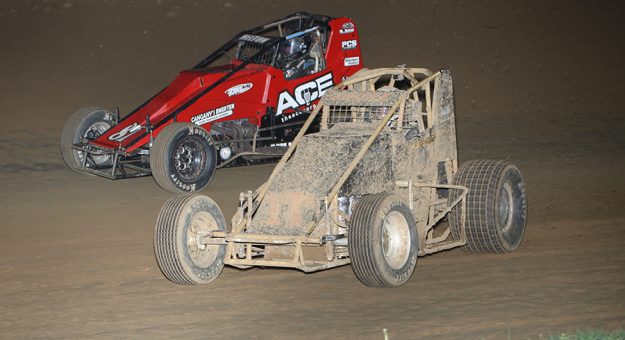With the costs to race sprint cars continuing to escalate, the new Steel Block Sprints Association is a breath of fresh air
 With the costs to race sprint cars continuing to escalate, the new Steel Block Sprints Association is a breath of fresh air. The second-year, non-winged dirt sprint car series is providing affordable racing and an entry level sprint car option that can be used to gain experience in a competitive environment.
With the costs to race sprint cars continuing to escalate, the new Steel Block Sprints Association is a breath of fresh air. The second-year, non-winged dirt sprint car series is providing affordable racing and an entry level sprint car option that can be used to gain experience in a competitive environment.
The series features a mix of veteran and youthful drivers.
In October 2020, Billy Winsemann took his sprint car to the fifth-mile Thunder Valley Raceway in Salem, Ind. The track had never hosted sprint cars and wanted Winsemann to put on an exhibition during intermission. The exhibition was a hit with fans and the promoter.

A couple of weeks later, Winsemann mentioned his Salem experience to fellow driver Dave Gross.
“Billy mentioned something to me about Salem wanting a race,” Gross recalled. “He said we should do it and make the rules where you must have a steel-block-only engine. I liked the idea and I told him I‘m all in. I came up with the name and logo for the group and it kind of took off from there.”
The Steel Block Sprint Association‘s rules are simple and straight to the point. Racers may use any size engine, as long as it‘s a steel block. Only methanol fuel is permitted. In addition, the series features an open-tire policy and any brand of tire and compound can be utilized. No adjustable shocks are allowed.
Safety is taken seriously and containment seats and up-to-date seat belts are required.
“In December 2020, I opened a Facebook page and put our logo on it to see if there was any interest,” Gross recalled. “We got a bunch of guys interested in it, so we went ahead and booked some shows at Thunder Valley Raceway, Twin Cities Raceway Park in North Vernon and Circle City Raceway in Indianapolis.”
The initial event at Thunder Valley had a modest car count but the foundation had been laid for the upstart series.
“They (Salem) were a Friday night track and we knew the car count could be low and we only had six cars. The guy that ran the track said if we could bring six to 12 cars, he would be happy,” Gross said. “The crowd really liked it. The next night we ran at Twin Cities Raceway Park. We had 12 cars that night and literally doubled our car count. We had 18 cars at Circle City and it continued to grow throughout the season.”
One of the more unique rules in the series is the open-tire rule which is practically unheard of in today‘s racing landscape as tracks and series rely heavily on tire sales to survive.

“There is no tire rule” Gross explained. “Run whatever you want. You can soak them with whatever you want. We aren‘t testing tires. Do whatever you want. Nobody has a problem with it. In fact, it‘s an attraction. Guys like the fact they can do whatever they want and run whatever brand they want.”
Another attractive aspect of the series is the open-engine rule. Due to the modest purse of $500 to win and $100 to start, officials feel like teams won‘t invest heavily in engines.
“The only rule is that it has to be a steel block,” Gross said. “You can run fuel injection, carburetor, whatever you want. You can run aluminum heads. You can do whatever you want inside the motor as well.”
The series features a good mixture of younger and older drivers with various levels of experience.
“It‘s good for old guys like us who are close to getting out of it or young drivers just getting started,” Gross noted. “And financially, it‘s just a good class to get into. You don‘t have to spend a lot of money to be competitive. My car is an older car. It‘s a 27-year-old J&J chassis. I run a 355 Vortech engine out of a pick-up truck. I‘ve got less than $2,000 in the engine and picked the car up at a swap meet for $400. I‘ve got less than $3,000 in the entire car. I can run top five and sometimes top three. We had a guy win at Circle City Raceway with a carbureted stock crate engine. It doesn‘t take a monster motor to be competitive in this series and that‘s what‘s fun about it.”
Chad Freeman captured the inaugural championship with an older car and limited racing experience. The Kentucky driver likes the fact it doesn‘t cost an arm and a leg to be competitive.
“It is a Central Indiana sprint car series that mandates you have to run a steel-block motor,” explained Freeman. “We get 305s 360s and 410s. The series just makes a lot of financial sense for most of us.”
